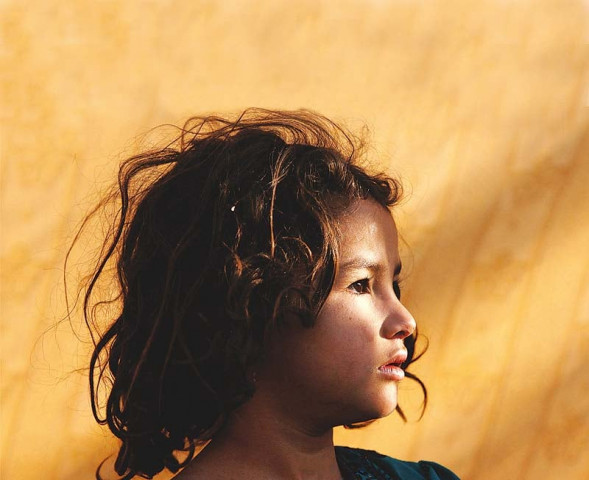Jalozai camp: Songs of home
Hope of a better life after repatriation fuels dreams of displaced children at Jalozai camp

Hamida, a six-year old who fled a military offensive in the Swat valley region, sits outside a food distribution tent. PHOTO: REUTERS
Nine-year-old Javed Shireen came to Jalozai from the Malik Din Khel area of Bara tehsil with his mother in 2010. “I am living here for the last five years. The region was wracked by unrest, insecurity and bombardment, which is why we migrated to this camp,” he says. Khyber Agency has been one of the worst-hit areas by the wave of militancy. The army launched an operation in 2008 to clear the region but success has been measured. Presently, operation Khyber-II is under way to restore normalcy in the area. “Life here (at the camp) is very tough. There is a shortage of basic facilities and I miss my friends, the greenery and the mountains,” he adds. Javed goes to school at a camp set up by a non-governmental organisation (NGO) but says he misses his own school.

A group of boys at the Jalozai camp in Nowshera, Khyber-Pakhtunkhwa. PHOTO CREDIT: MAHWISH QAYYUM
With their childhood already lost, many of the displaced sons and daughters of the soil have no hope for a better future. Seven-year-old Afsha Alam, who is running around the camp barefoot along with other children, explains, “I belong to Khyber Agency. My siblings and parents came here, and that’s why I am here with them.” Unlike Javed, Afsha does not go to school, she sells ration at a depot. “The sound of bombs and shelling still haunts me,” she quietly adds. Eight-year-old Shaista Daud from the embattled Tirah valley, which has long been embroiled in a turf war between different militant factions, says, “It is very hot in the camp. I do not like this place. We came here to save our lives. Schools, homes and other places in our hometown have been destroyed by terrorists.” Shaista yearns to go to school, but her mother doesn’t let her. When asked why, she starts crying.
Social customs and traditions of the tribal people have cost Shaista and many other girls from the Federally Administered Tribal Areas the chance to get an education. They either engage in child labour or spend their days playing with others their age. Field Officer of the Provincial Disaster Management Authority at Jalozai camp Raina Shah admits a majority of girls do not go to school. “Approximately 10,000 children are living at the camp, of which over 7,000, including 2,000 girls, attend school. There are 10 schools set up at the camp by different NGOs.” Independent sources, however, contest the figures, saying the number of school-going children is greatly exaggerated.
Life at the camp is brutal and many children long to return to their homeland and resume normal life. Khyber-Pakhtunkhwa Governor Sardar Mehtab Ahmad Khan had earlier announced that the repatriation process is well under way. According to him, 110,000 IDPs from Khyber, North Waziristan and South Waziristan agencies have so far been repatriated. He added that by August this year, 600,000 IDPs would have been sent back to their homes. He has also pledged to rebuild infrastructure, such as roads, schools and health centres, destroyed during years of fighting.

An internally displaced girl Laiba, whose family fled the military operations in Khyber Agency, sits outside her family tent at the UNHCR Jalozai camp. PHOTO: REUTERS
Despite the assurance, many displaced people have little hope of ever leading normal lives; one free from the violence that has plagued them for so many years. Even when they return to their hometowns, they will have little to build upon. The children who have been deprived of an education are likely to continue to spend their days running around the mountains and open fields, wondering on which side the grass is greener.
Mahwish Qayyum is a Peshawar-based reporter for Express News.
Published in The Express Tribune, Sunday Magazine, May 24th, 2015.



















COMMENTS
Comments are moderated and generally will be posted if they are on-topic and not abusive.
For more information, please see our Comments FAQ